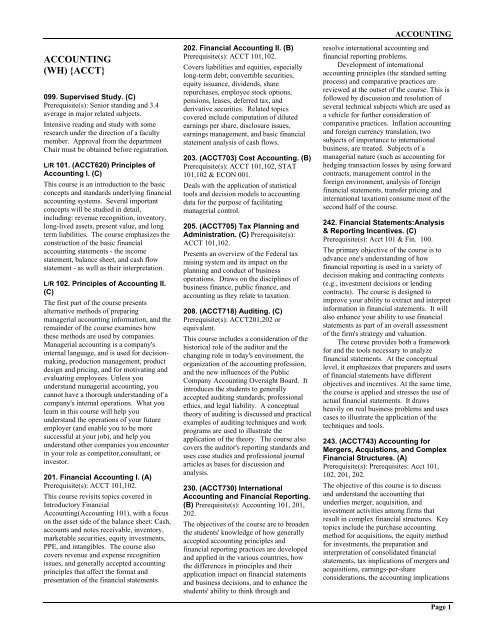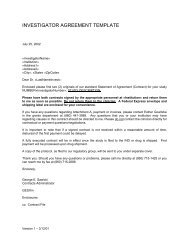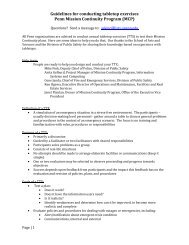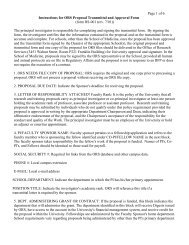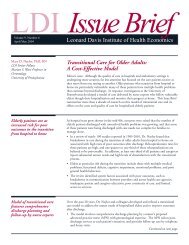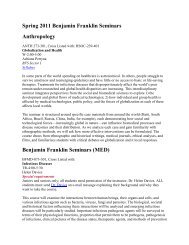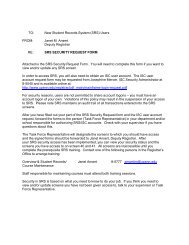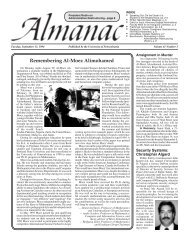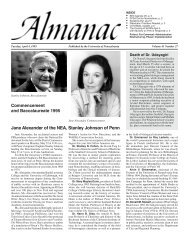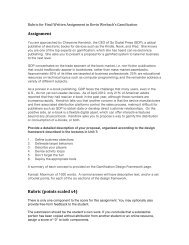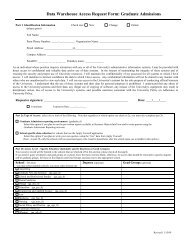2009-2010 COURSE REGISTER - University of Pennsylvania
2009-2010 COURSE REGISTER - University of Pennsylvania
2009-2010 COURSE REGISTER - University of Pennsylvania
Create successful ePaper yourself
Turn your PDF publications into a flip-book with our unique Google optimized e-Paper software.
ACCOUNTING<br />
(WH) {ACCT}<br />
099. Supervised Study. (C)<br />
Prerequisite(s): Senior standing and 3.4<br />
average in major related subjects.<br />
Intensive reading and study with some<br />
research under the direction <strong>of</strong> a faculty<br />
member. Approval from the department<br />
Chair must be obtained before registration.<br />
L/R 101. (ACCT620) Principles <strong>of</strong><br />
Accounting I. (C)<br />
This course is an introduction to the basic<br />
concepts and standards underlying financial<br />
accounting systems. Several important<br />
concepts will be studied in detail,<br />
including: revenue recognition, inventory,<br />
long-lived assets, present value, and long<br />
term liabilities. The course emphasizes the<br />
construction <strong>of</strong> the basic financial<br />
accounting statements - the income<br />
statement, balance sheet, and cash flow<br />
statement - as well as their interpretation.<br />
L/R 102. Principles <strong>of</strong> Accounting II.<br />
(C)<br />
The first part <strong>of</strong> the course presents<br />
alternative methods <strong>of</strong> preparing<br />
managerial accounting information, and the<br />
remainder <strong>of</strong> the course examines how<br />
these methods are used by companies.<br />
Managerial accounting is a company's<br />
internal language, and is used for decisionmaking,<br />
production management, product<br />
design and pricing, and for motivating and<br />
evaluating employees. Unless you<br />
understand managerial accounting, you<br />
cannot have a thorough understanding <strong>of</strong> a<br />
company's internal operations. What you<br />
learn in this course will help you<br />
understand the operations <strong>of</strong> your future<br />
employer (and enable you to be more<br />
successful at your job), and help you<br />
understand other companies you encounter<br />
in your role as competitor,consultant, or<br />
investor.<br />
201. Financial Accounting I. (A)<br />
Prerequisite(s): ACCT 101,102.<br />
This course revisits topics covered in<br />
Introductory Financial<br />
Accounting(Accounting 101), with a focus<br />
on the asset side <strong>of</strong> the balance sheet: Cash,<br />
accounts and notes receivable, inventory,<br />
marketable securities, equity investments,<br />
PPE, and intangibles. The course also<br />
covers revenue and expense recognition<br />
issues, and generally accepted accounting<br />
principles that affect the format and<br />
presentation <strong>of</strong> the financial statements.<br />
202. Financial Accounting II. (B)<br />
Prerequisite(s): ACCT 101,102.<br />
Covers liabilities and equities, especially<br />
long-term debt, convertible securities,<br />
equity issuance, dividends, share<br />
repurchases, employee stock options,<br />
pensions, leases, deferred tax, and<br />
derivative securities. Related topics<br />
covered include computation <strong>of</strong> diluted<br />
earnings per share, disclosure issues,<br />
earnings management, and basic financial<br />
statement analysis <strong>of</strong> cash flows.<br />
203. (ACCT703) Cost Accounting. (B)<br />
Prerequisite(s): ACCT 101,102, STAT<br />
101,102 & ECON 001.<br />
Deals with the application <strong>of</strong> statistical<br />
tools and decision models to accounting<br />
data for the purpose <strong>of</strong> facilitating<br />
managerial control.<br />
205. (ACCT705) Tax Planning and<br />
Administration. (C) Prerequisite(s):<br />
ACCT 101,102.<br />
Presents an overview <strong>of</strong> the Federal tax<br />
raising system and its impact on the<br />
planning and conduct <strong>of</strong> business<br />
operations. Draws on the disciplines <strong>of</strong><br />
business finance, public finance, and<br />
accounting as they relate to taxation.<br />
208. (ACCT718) Auditing. (C)<br />
Prerequisite(s): ACCT201,202 or<br />
equivalent.<br />
This course includes a consideration <strong>of</strong> the<br />
historical role <strong>of</strong> the auditor and the<br />
changing role in today's environment, the<br />
organization <strong>of</strong> the accounting pr<strong>of</strong>ession,<br />
and the new influences <strong>of</strong> the Public<br />
Company Accounting Oversight Board. It<br />
introduces the students to generally<br />
accepted auditing standards, pr<strong>of</strong>essional<br />
ethics, and legal liability. A conceptual<br />
theory <strong>of</strong> auditing is discussed and practical<br />
examples <strong>of</strong> auditing techniques and work<br />
programs are used to illustrate the<br />
application <strong>of</strong> the theory. The course also<br />
covers the auditor's reporting standards and<br />
uses case studies and pr<strong>of</strong>essional journal<br />
articles as bases for discussion and<br />
analysis.<br />
230. (ACCT730) International<br />
Accounting and Financial Reporting.<br />
(B) Prerequisite(s): Accounting 101, 201,<br />
202.<br />
The objectives <strong>of</strong> the course are to broaden<br />
the students' knowledge <strong>of</strong> how generally<br />
accepted accounting principles and<br />
financial reporting practices are developed<br />
and applied in the various countries, how<br />
the differences in principles and their<br />
application impact on financial statements<br />
and business decisions, and to enhance the<br />
students' ability to think through and<br />
ACCOUNTING<br />
resolve international accounting and<br />
financial reporting problems.<br />
Development <strong>of</strong> international<br />
accounting principles (the standard setting<br />
process) and comparative practices are<br />
reviewed at the outset <strong>of</strong> the course. This is<br />
followed by discussion and resolution <strong>of</strong><br />
several technical subjects which are used as<br />
a vehicle for further consideration <strong>of</strong><br />
comparative practices. Inflation accounting<br />
and foreign currency translation, two<br />
subjects <strong>of</strong> importance to international<br />
business, are treated. Subjects <strong>of</strong> a<br />
managerial nature (such as accounting for<br />
hedging transaction losses by using forward<br />
contracts, management control in the<br />
foreign environment, analysis <strong>of</strong> foreign<br />
financial statements, transfer pricing and<br />
international taxation) consume most <strong>of</strong> the<br />
second half <strong>of</strong> the course.<br />
242. Financial Statements:Analysis<br />
& Reporting Incentives. (C)<br />
Prerequisite(s): Acct 101 & Fin. 100.<br />
The primary objective <strong>of</strong> the course is to<br />
advance one's understanding <strong>of</strong> how<br />
financial reporting is used in a variety <strong>of</strong><br />
decision making and contracting contexts<br />
(e.g., investment decisions or lending<br />
contracts). The course is designed to<br />
improve your ability to extract and interpret<br />
information in financial statements. It will<br />
also enhance your ability to use financial<br />
statements as part <strong>of</strong> an overall assessment<br />
<strong>of</strong> the firm's strategy and valuation.<br />
The course provides both a framework<br />
for and the tools necessary to analyze<br />
financial statements. At the conceptual<br />
level, it emphasizes that preparers and users<br />
<strong>of</strong> financial statements have different<br />
objectives and incentives. At the same time,<br />
the course is applied and stresses the use <strong>of</strong><br />
actual financial statements. It draws<br />
heavily on real business problems and uses<br />
cases to illustrate the application <strong>of</strong> the<br />
techniques and tools.<br />
243. (ACCT743) Accounting for<br />
Mergers, Acquistions, and Complex<br />
Financial Structures. (A)<br />
Prerequisite(s): Prerequisites: Acct 101,<br />
102, 201, 202.<br />
The objective <strong>of</strong> this course is to discuss<br />
and understand the accounting that<br />
underlies merger, acquisition, and<br />
investment activities among firms that<br />
result in complex financial structures. Key<br />
topics include the purchase accounting<br />
method for acquisitions, the equity method<br />
for investments, the preparation and<br />
interpretation <strong>of</strong> consolidated financial<br />
statements, tax implications <strong>of</strong> mergers and<br />
acquisitions, earnings-per-share<br />
considerations, the accounting implications<br />
Page 1


